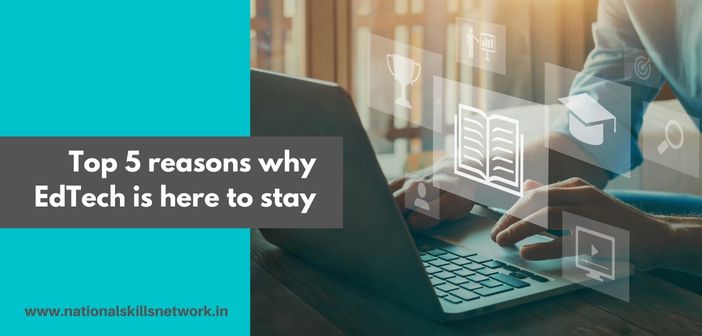Guest Authors: Mr. Harsh Nagpal, TCS iON, Lead – Skills Enablers Business and Ms. Sakshi Kapoor, TCS iON, Manager – Skills Enablers Business
The application of digital technologies in the world of work is not only changing the way we live but also shifting gears to improve the Technical Vocational Education and Training (TVET) systems by identifying future skills demands and expanding access to skill development opportunities. With the changing dynamics in social, environmental, and economic disruptions, TVET has also evolved to adapt itself with innovative practices with the potential to rejuvenate the future of skill development.


Back in March 2020 when the pandemic unleashed in the most unexpected manner, none of us had any idea of our potential and capabilities for sustaining incredibly tough times. This ‘new normal’ has truly redefined us in many ways across various facets of life by fast-forwarding our lives to 5 years in the future. For instance, while digitalization has been a part of our lives even before the pandemic by way of digital payments and a bit of digital learning, COVID-19 has accelerated its penetration in every aspect of our existence, and education could not remain untouched.
The invasion of technology into education has crafted an entirely new chapter in history and unleashed the power of EdTech in many ways.
What is EdTech
EdTech is an amalgamation of IT tools in the classrooms to create an even more engaging, immersive, and inclusive learning experience. With an infinite number of gadgets around and even more outside influences of social networks (like Instagram, Facebook, Twitter etc.), it is imperative to have the sessions both engrossing and educational. Technology itself being the distraction here, it is to note that ‘Technology’ is the only answer to all these concerns, and we must be cognizant of the fact – Technology in education is here to stay!
Here are the top 5 reasons why EdTech is here to stay
1. Accelerated use of technology in education and skilling
Accelerated by COVID-19, technology has been driving several systems and processes in education and skilling. Many educational institutions and training organizations are extensively leveraging technology in imparting knowledge, training and also assessing the students’ performances. The curriculum in training institutions has also been evolving to blend with digital platforms. Many stakeholders have been coming together and collaborating to accelerate technology uptake and build a digital ecosystem.
2. The need to acquire digital skills
We must realize the fact that the intensification of technology in our lives has bound us to acquire digital skills which could be as basic as Computer Literacy, Data Storing, and social media to an advanced version of Artificial Intelligence, Machine Learning, Data Analytics, Digital Marketing, Internet of Things, among others. The World Economic Forum estimates that by 2025, 85 million jobs may be displaced by a shift in the division of labour between humans and machines, while 97 million new roles may emerge adapted to the new division of labour between humans, machines and algorithms. India is best suited to embrace digital learning mainly because over 54% of the total population is in the working age group of 15-59 years. The digital skills gap is surprisingly getting more prominent across the world.
For example: Canada reported a record-low unemployment rate of 4.9% in June 2022, owing to the rising demand for digital skills and growing concerns over the shortage. Only 28% of Canadians rate their digital communication skills as ‘Advanced’[1]. In the case of Australia, there is a major gap in digital skills across Australia’s workforce, with 87 per cent of jobs now requiring these skills, and a need for 156,000 new technology workers to keep pace with the rapid transformation of businesses[2]. “While the need for digital skills has been growing for years, this research shows that job changes due to the COVID-19 pandemic have accelerated the need for more training for both tech and non-tech workers on digital capabilities. Similarly, for Germany, it has been published that the IT skills gap is so large that the number of vacancies is above the level before the start of the crisis in March 2020 and the shortage is continually growing[3].
EdTech is also a tool to facilitate gaining these digital skills along with other proficiencies. Hence, EdTech has emerged as a primary enabler in acquiring digital skills in an immersive and engaging manner.

3. Increasing adoption of the blended mode of learning
Blended, as the term suggests is a combination of classroom (offline) learning and digital (online) learning. The term translates to overlaying of online learning tools/ technologies over physical classroom infrastructure wherein the theory segment of the syllabi is taught in digital mode while the practical skills are imparted in the practical learning centers.
For example, if the student is learning the textbook content in the exact same manner (written in paragraphs) over the tablet/any device, it’s not adding value at all. However, if the same content is being taught by way of interactive methodologies like audio-visual aids, video tutorials, recorded lectures etc., it is then of some benefit to the students.
4. Expanded reach, accessibility and scaling of skilling initiatives
During the pandemic, many skill training institutes started taking advantage of technology to enhance, automate and scale up their operations across various locations in the country. With the use of technology, several training programs and skilling initiatives could be measured, replicated and scaled up without compromising on quality. This has enabled the skill training institutions to leverage the opportunity to take the skilling initiatives to remote areas of the country too, which otherwise lacked access to quality training as per the local needs.
5. Innovative ways to make learning effective
The influx of EdTech into the classrooms has introduced newer ways of how interacting with each other in our classrooms and with our teachers. A personalized learning style fosters self-learning, creativity, and a sense of collaboration among students. From the educator aspect, they are now able to craft personalized learning plans for their student’s basis their pace of learning. The invasion of technology into education must not only bring even more innovative ways to effective learning and must complement the existing offline education mechanism but also should assist the learning of digital skills. Hence, it is pertinent to ensure that we must have absolutely innovative strategies incorporated in the content created to be delivered via online mode.
This paradigm shift in the learning mode had earlier muddled up the people, thinking this can be the only method to teach and learn. However, we should not become oblivious that EdTech is not only online learning, remote learning, or distance learning with no wisdom at all.
We must learn from the past and should realize the fact that technology in education can and will favour us till the time we keep this paradigm shift balanced by not completely obsoleting offline classroom learning.
EdTech can assist in the reinforcement of learning if we indulge in limited capacities to take the best use of it by way of introducing tools which complement offline learning and reduce unwanted human efforts, for example – Learning Management System (to help track the student journey right from the prospect to the alumni) which got evolved to emulate real-time classroom learning experience; Digital learning (to help students with the recorded sessions, gamified learning, audiovisuals, case studies, 24*7 doubt clearing, etc.). These new immersive ways are still evolving rapidly but while the world is witnessing its unprecedented growth, they are only meant to deliver best-in-class quality education to the last mile and create an ecosystem of learning anytime, anywhere, on any device and in any location.
Hence, the advancement that the pandemic has brought into our lives by way of EdTech needs to be nurtured and should not be left at the discretion of any of the stakeholders (for instance – letting students find out relevant videos from YouTube – they might end up watching irrelevant content around). It should not be used only as a different dissemination medium of information but must add value by way of facilitating digital skills and augmenting the overall learning and teaching experience for both teachers and learners.
References:
[1] The survey conducted by Salesforce Canada, 2022
[2] A report published by RMIT Online, Feb 2021
[3] As per KOFA (Kompetenzzentrum Fachkräftesicherung) report from Sep 2021
Click here to know more about programs offered by TCS iON in technical and vocational education – https://learning.tcsionhub.in/hub/ve/
For more information about TCS iON phygital model for vocational education, please email at tcsion.ve@tcs.com














